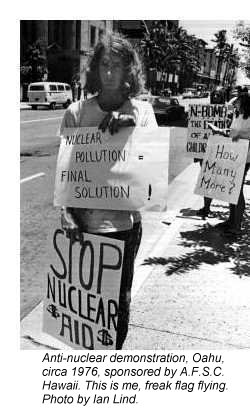

|
| weblog/wEssays | home | |
|
Why Is This Such a Tepid Time? (November 17, 2005) The current dearth of innovative, indelibly great music which I profiled yesterday drew a number of responses. A very good friend who is also a professional musician emailed me these comments: Great blog! Right on the nail head. The staying power of "our" music is truly remarkable and today's music is mostly just 'so what'. I think another factor is music and art meant a lot more to our generation than art does to kids today. People ridicule the hippie generation and the sixties, but we were truly passionate about what we believed in, and a lot of great art was created in those few years. Another example is the poster art of the Fillmore and Family Dog era with artists like Moscoso, Kelly, Conklin, Mouse, and Griffin creating throw away weekly posters that are worth thousands today! I don't see that today; today's kids are freaking idiots, generally speaking. They just want the latest gadget in a new color. And the things we valued back then are still valid now because we had that passion. We grew up in turbulent times and I think we made them turbulent by our involvement in wanting to change things; and out of that turmoil blossomed great art. The world situation is worse than it was then but there's just apathy going around. No passion, no art. Sad times.  Another thoughtful friend contrasted the broad artistic and cultural foment of the 60s and early 70s with the
narrow impact which the Internet has had on society in the past 10 years. Yes, the Web has
changed the world, almost entirely for the better, but its impact on art, music and culture is largely
commercial, not creative. Art, music, dance and society's morbid fascination with consumerist excess remains
pretty much as they were in 1995 or even 1985.
Another thoughtful friend contrasted the broad artistic and cultural foment of the 60s and early 70s with the
narrow impact which the Internet has had on society in the past 10 years. Yes, the Web has
changed the world, almost entirely for the better, but its impact on art, music and culture is largely
commercial, not creative. Art, music, dance and society's morbid fascination with consumerist excess remains
pretty much as they were in 1995 or even 1985.
If you doubt this, compare the art, music, dance and cultural influences of 1960 with those of 1970. The 60s were a revolution on every fundamental level: the role of women, ethnic identity and pride, the technological impact of early computers, the searing revelations of secrecy and deception in our government, and incredible innovations in music, art, dance and film. Virtually no field of endeavor or cultural edifice remained untouched by the Counterculture and the civil rights, feminist, ecology and anti-war movements, each of which was entwined with art, bold criticism and social innovations: communes, renewed spiritualism, etc.  One would be forgiven for expecting the Web to have had a wider and deeper impact on society. Yes, it has
sparked innovations, but these are largely in the commercial and communications areas. OK, so you can have
a hundred myspace.com pals and a lengthy list of phone numbers in your mobile phone, but how many real
friendships have you nurtured with all that communicating? To a skeptic, it seems as if the entire
"revolution" is a meta-game in which worker bees sacrifice communion, creative time and actual
friendships to better serve the gods of increasing productivity.
One would be forgiven for expecting the Web to have had a wider and deeper impact on society. Yes, it has
sparked innovations, but these are largely in the commercial and communications areas. OK, so you can have
a hundred myspace.com pals and a lengthy list of phone numbers in your mobile phone, but how many real
friendships have you nurtured with all that communicating? To a skeptic, it seems as if the entire
"revolution" is a meta-game in which worker bees sacrifice communion, creative time and actual
friendships to better serve the gods of increasing productivity.
From this point of view, the consumerist "state religion" has bamboozled the average American, offering them the illusions of friendship and communal ties with techno-toys and an endless distraction of computer games, online chats and music and video downloads. But in exchange for these dazzling, mind-numbing toys, the consumer/worker must relentlessly increase his or her productivity. Consider how the tools of productivity--Blackberries, cellphones and online "collaborations"--are nearly identical with the toys--cellphone cameras and games, I.M. and collaborative gaming. The meta-game enables corporations to increase their profits annually by a staggering 15% year after year, amassing an unprecedented cash horde of $2 trillion, while the worker bees take their tiny raises (barely keeping up with inflation, if that) and go out to buy another gimcrack electronic "entertainment." Marx warned that religion was the opiate of the masses; perhaps now he would see the real opiate is an ennervating, bland consumerism which actively seeks to turn everyone into 18-hours-a-day, sleep-deprived "consumers" of "entertainment." Is it any wonder the "entertainment" is so empty and tepid? How could it be otherwise? For more photos, both archival and present, by Ian Lind of Ka'a'awa, Hawaii, visit ilind.net * * * copyright © 2005 Charles Hugh Smith. All rights reserved in all media. I would be honored if you linked this wEssay to your site, or printed a copy for your own use. * * * |
||
| weblog/wEssays | home |